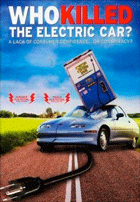
Director: Chris Paine
Duration: 92 minutes
Year: 2006
Key words: Air quality, corporate interests, environmental activism
Summary: Director Chris Paine tries to find out who was responsible for the newly developed electric car being pulled from the market in California and destroyed less than ten years after its launch.
Degree of public health theme coverage: This documentary is not directly related to public health but the issues of corporate power and political processes that relate to the key public health issues of air pollution, climate change and consumer access to energy efficient transport, are well covered. There is some specific consideration of the health impacts of air pollution, and on the problem of climate change. The processes of CARB (California Air Quality Board) are well considered. Industry tactics to oppose electric vehicles (EVs) are also relevant to public health as they are used elsewhere eg, by the tobacco industry. These tactics include: legal action, PR campaigns against EVs, establishing fake opposition groups, and deflecting attention to another technology (in this case hydrogen fuel cells). The role of regulation in advancing safety and air pollution control is covered eg, California needed laws to make progress with seatbelts, air bags, catalytic converters and raising vehicle fuel efficiency. Score=4/5
Sophistication of analysis of public health content:The analysis is very sophisticated compared to most documentaries. There is a wide range of data presented on the issues and interviews with many experts (including Ralph Nader and experts with PhDs). There is accompanying movie coverage of various key events in the story. The evidence for and against various “guilty” or “not guilty” verdicts is well developed. The levels of analysis cover: consumer attitudes, oil company response, car company response, battery performance, the response of CARB, the Federal Government response, and the hydrogen fuel cell issue. Score=5/5
Potential for empowerment and use of advocacy: The movie provides examples of skilled advocacy techniques used by various players including: (i) group action by consumers for EVs eg, vigils, a mock funeral, and filming car companies destroying EVs; (ii) presentations to the CARB, and (iii) the movie itself is an example of skilled advocacy. Although these activities ultimately did not save the EV at this time in California – this may not appear too discouraging given the size of the opposition by corporate power. (Furthermore there has been subsequent progress with developing plug-in hybrid cars in various countries – including the USA). Score=4/5
Persuasiveness of the movie: The documentary nature contributed to this film's plausibility along with the overall depth of the analysis and range of data presented (both for and against various theories). Some of the interviewees had high credibility eg, Ralph Nader (the consumer advocate) and technology experts who had written books and/or who had PhDs. For some viewers the celebrities interviewed (eg, Tom Hanks, Mel Gibson) might add to the persuasiveness. There were plenty of examples of members of the public who were very enthusiastic about the EVs that they had owned. The narrator (Martin Sheen) is also a fairly well known person. Score=5/5
Engagement & cinematic quality: The movie is very engaging and fairly fast paced. It tells a dramatic story that has a “murder mystery” element. It also has a type of “David vs Goliath” theme. There is a good balance in how the evidence is built up. The mix of people interviewed and the filming of events in action is also well done.Score=5/5
Total score = 23/25
Questions for discussion:
- Do you agree with the verdicts (ie, “guilty” for the consumer, the oil companies, the car companies, CARB and the hydrogen fuel cell; and “not-guilty” for the battery performance)?
- What needs to be done to better control how corporate power might influence decision makers (eg, at the local and national government levels)?
Other information:
- The DVD has extra scenes that may be of interest.
- There is a Wikipedia article on this movie - found here
- The trailer can be seen on YouTube - found here
- Back to Films in Undergraduate Public Health Teaching home page
CONTACT US
Associate Professor Nick Wilson
Department of Public Health
University of Otago, Wellington
PO Box 7343
Wellington South 6242
New Zealand
Tel: +64 4 385 5541 ext 6469
Fax: +64 4 389 5319
Email: nick.wilson@otago.ac.nz